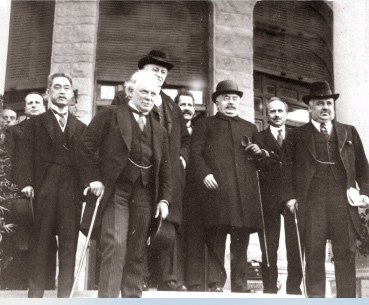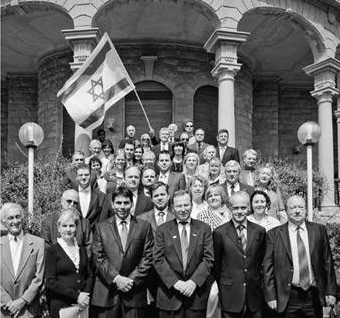WE CALL ON THE GOVERNMENT OF ISRAEL,
on this
100TH ANNIVERSARY OF
THE SAN REMO RESOLUTION
To declare April 25th of each year
THE SAN REMO NATIONAL HOLIDAY
If you wish to add your name to the call, please email us: goldi@israelslegalrights.org Your name will be added to the list will be submitted to the PM
NOTICE! APRIL 26TH SAN REMO COMMEMORATION UNDER WAY. DETAILS WILL FOLLOW SOON
Now, 100 years after the San Remo Conference, the time has come to demand that the GOI proclaim once and for all to the world community that Israel has biblical, historical, indigenous, and Legal Rights to the land of Israel from the river to the sea. This was declared in the San Remo Resolution of the 25th of April 1920, adopted by the Allied Powers, and confirmed in the Mandate for Palestine two years later by 51 members of the League of Nations. Let us focus on this message to the Government of Israel. This is our mission’s raison d’être. Following the Centenary, this mission must be carried on by all Israel-loving people and entities, for as long as it takes to gain recognition of our rightful place among the nations of the world. Goldi Steiner & Irving Weisdorf Co-Chairs-CILR
San Remo Conference 1920-2010

In 2010, CANADIANS FOR ISRAEL’S LEGAL RIGHTS (CILR) in co-operation with the EUROPEAN COALITION FOR ISRAEL (EC4I), commemorated the San Remo Resolution in San Remo, at the very location – the Villa DeVachan – where the original Conference was held. (see photo). Five years later, in 2015, an article by the late Salomon Benzimra, has been published in a number of publications and hailed worldwide. (Please read) …..one of the commentators got it: THIS FACT SHOULD BE SHOUTED FROM ROOFTOPS BY ISRAELI LEADERS FOR ALL THE WORLD TO HEAR - ONCE AND FOR ALL. SILENCE IS NOT GOLDEN! How can there be peace and reconciliation without acknowledging fundamental historical and legal facts? Salomon Benzimra, Co-Founder of Canadians for Israel’s Legal Rights-CILR. Salomon’s tragic passing moved friends and associates throughout the world. Returning from a historical visit to Israel, organized by Canadians for Israel’s Legal Rights, his life ended on ElAl Flight xxxx. On March 15, 2016. He was, accompanied by his partner and soul-mate, Goldi Steiner, Co-founder and Co-Chair of CILR. Salomon was part of a delegation that met with then Education Minister Naftali Bennett, Tzipi Hotovely, Deputy FM, and other high profile Israeli politicians.
SAN REMO: THE FORGOTTEN MILESTONE (first published on April 25, 2015, in Israel National News)
Close to 100 years ago, prime ministers, ambassadors and other dignitaries from Europe and America gathered on the Italian Riviera. Journalists from around the world reported on the upcoming San Remo Peace Conference and the great expectations the international community placed on this event, just a year after the Paris Peace Conference had settled the political map of Europe at the end of World War One. On Sunday, April 25, 1920, after hectic deliberations, the Supreme Council of the Allied Powers (Great Britain, France, Italy, Japan and the U.S. acting as an observer) adopted the San Remo Resolution -- a 500-word document which defined the future political landscape of the Middle East out of the defunct Ottoman Empire. This Resolution led to the granting of three Mandates, as defined in Article 22 of the 1919 Covenant of the League of Nations. The future states of Syria-Lebanon and Iraq emerged from two of these Mandates and became exclusively Arab countries. But in the third Mandate, the Supreme Council recognized the “historical connection of the Jewish people to Palestine and the grounds for reconstituting their national home in that country,” while safeguarding the “civil and religious rights” of the non-Jewish population. Subsequently, the British limited the Jewish Homeland in Palestine to the area west of the Jordan River and allowed eastern Palestine to be gradually administered by the Hashemites. The territorial expansion to the east eventually gave birth to the Kingdom of Transjordan, later renamed Jordan in 1950. The importance of the San Remo Conference with regard to Palestine cannot be overstated:
For the first time in history, Palestine became a legal and political entity;
The Jewish people were recognized as the national beneficiary of the trust granted to Britain in Palestine for the duration of the Mandate -- a “sacred trust of civilization” as per the League Covenant;
The Balfour Declaration of 1917 -- which “viewed with favour” the establishment of a Jewish National Home in Palestine -- was now to be “put into effect” and thus became a binding act in international law;
The de jure sovereignty of Palestine was vested in the Jewish people, though it was kept in abeyance until the Mandate expired in 1948;
The terms of the San Remo Resolution were included in the Treaty of Sèvres and remained unchanged in the finally ratified Treaty of Lausanne of 1923.
The Arabs received equivalent national rights in all the remaining parts of the Middle East -- over 96% of the total area formerly governed by the Ottoman Turks).
The San Remo Conference was hailed as a major historical milestone. Celebrations were held throughout the world with tens of thousands of people marching in London, New York and Toronto. But the Arabs of Palestine, led by the Egyptian-born Mufti of Jerusalem, were strongly opposed to any form of national Jewish homeland. The first anti-Jewish riots erupted in Jaffa just before the San Remo Conference convened -- a harbinger of the violent, Arab rejectionist stance that continues to threaten the existence of Israel to this day. While the Middle East peace process has been going on for over two decades, it is astonishing that San Remo and the ensuing Mandate for Palestine have hardly been mentioned. Is it deliberate? Is it a mere omission? How could there be peace and reconciliation without acknowledging fundamental historical and legal facts? Middle-East diplomacy has often relied on “constructive ambiguity”, a concept earlier introduced by Henry Kissinger to keep the dialogue open and avoid discussing core issues deemed problematic. In the ongoing peace process, the ambiguity of language did not produce constructive results. On the contrary, layer upon layer of distortions and gross falsehoods piled up over the initial ambiguity of “land for peace.” When the notion of “occupation” took root, it soon turned into “illegal occupation”, then “brutal oppression” and, finally, “apartheid” which is a crime against humanity in international law. Once corrupted language describes a distorted reality and the distortion spreads, thought becomes corrupt and any resulting action is bound to fail. Commemorating the San Remo Conference should be more than a mere remembrance. It enjoins us to consider the legal reach of the binding decisions made in 1920 and to ensure that we do not entertain incompatible positions when political expediency clashes with unassailable rights enshrined in international law, namely the acquired rights of the Jewish people in their ancestral land. No wonder the Palestinian Authority -- intent on eliminating the “Zionist entity,” as spelled out in the PLO Charter -- abhors the provisions of the San Remo Resolution, which they view as the root of a catastrophe engineered by “Zionist gangs.” In reality, the San Remo Resolution and the ensuing clauses of the Mandate for Palestine are akin to a treaty entered into and executed by each and every one of the 52 member states of the League of Nations, in addition to the United States which is bound by a separate treaty with Great Britain, ratified in 1925. So next time you hear about the “occupation of the West Bank” and its supposedly “illegal settlements” -- an almost daily occurrence in the discourse of the Palestinian Arabs and their supporters -- you should remember that this territory, like the rest of Israel, was lawfully restored to the Jewish people in 1920 and its legal title has been internationally guaranteed and never revoked since. Any negotiation towards achieving a lasting peace should be based on this fact. Last but not least, San Remo marked the end of the longest colonization period in history. After 1,850 years of foreign occupation, oppression and banishment by a succession of foreign powers (Romans, Byzantines, Sassanid Persians, Arabs, Crusaders, Mamluks and Ottoman Turks), the Nation of Israel was reborn in April 1920, thus paving the way for the proclamation of the State of Israel, 28 years later. This liberation from foreign rule should normally be celebrated by all the progressive elites who have traditionally supported every national freedom movement. But it isn’t so, for reasons that defy reason.










Comentarios